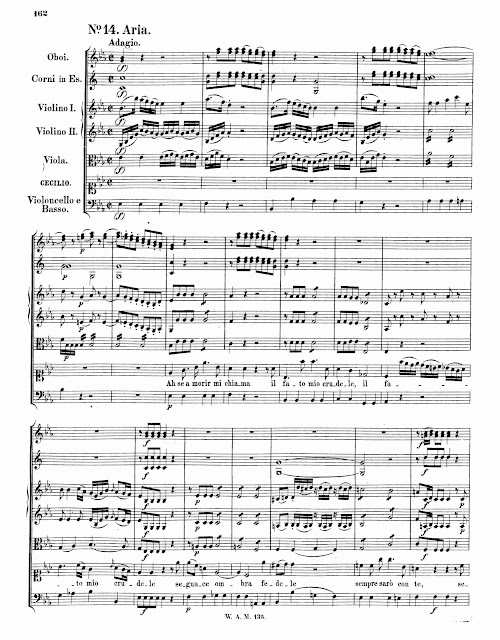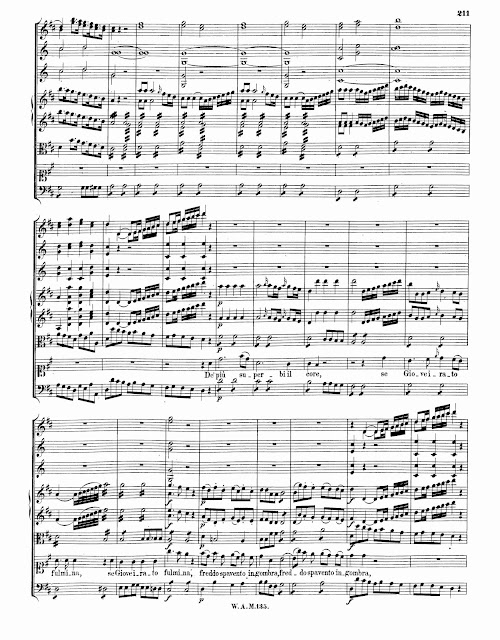DXVIIIb. MOZART, Wolfgang Amadeus (1756-1791)
Lucio Silla, K. 135 (1772)
Acts II and III (1:26:02)
Roberto Sacca, Lucio Silla
Annick Massis, Giunia
Monica Bacelli, Cecilio
Veronica Cangemi, Lucio Cinna
Julia Kleiter, Celia
Stefano Ferrari, Aufidio
Orchestra del Teatro La Fenice
Tomáš Netopil, cond.

8. (Aufidio): Guerrier, che d'un acciaro
Aufidio tries to turn Silla against Giunia, maintaining that Silla will never succeed in his purpose if he shows forbearance; he should announce publicly before the Senate and the people that Giunia is his bride, and then she would not dare oppose him.


9. (Cecilio): Quest'improvviso tremito
Silla tells his sister that he will unite her with his friend Lucio Cinna, he then hurries to the Capitol to put his plan into practice Although Cecilio wants to follow Silla, Cinna restrains him, warning him not to allow blind rage to lead him to any impetuous deed: such action might put Giunia in jeopardy, too. Cinna's mention of Giunia brings Cecilio to his senses for the meanwhile.
10. (Celia): Se il labbro timido
Overcome with joy, Celia hurries to Cinna to tell him that Silla has agreed to the marriage, but Cinna does not comprehend what she is trying to convey.
11. (Giunia): Ah se il crudel periglio

Cinna waits for Giunia and informs her that Silla, even without her consent, intends to announce their engagement publicly. Cilla suggests that Giunia pretend to become Silla's wife and then kill the dictator on their wedding night. Giunia refuses: Cinna should devote his energies to ensuring Cecilio's safety.

12. (Cinna): Nel fortunato istante
Cinna remains alone. Since Giunia has refused to murder Silla, Cinna resolves to kill the dictator himself.


13. (Silla):
D'ogni pietà mi spoglioAufidio informs Silla not only that the Senate is about to convene but that they are surrounded by a covert band of armed men. Cinna is said to be privy to the plan. Silla still cannot decide whether or not to do what he has intended. The sight of Giunia again arouses within him feelings of tenderness, yet she rejects him anew; she would rather die than become his wife. Silla threatens her with death, and not just hers alone.


14. (Cecilio):
Ah se a morir mi chiama
15. (Celia):
Quando sugl'arsi campiGiunia is left alone in a state of agitation. Though not afraid of dying herself, she is greatly concerned for Cecilio's life. She pleads with him to leave her to her fate and to escape to safety. Cecilio reluctantly consents. Celia attempts to comfort Giunia: heaven will make even her happy, just as she will not be released from prolonged suffering through her marriage to Cinna.


16. (Giunia):
Parto, m'affretto
17. (Chorus): Se gloria il crin ti cinse
On the Capitol the populace celebrate Silla. As a reward for his victories, Silla asks that the partricians and senators give their consent to his marriage to Marius' daughter, Giunia. She rebuffs him, however. Cecilio intervenes with his sword drawn, is disarmed and put in chains.
18. (Silla, Cecilio, Giunia): Quell'orgoglioso sdegno
The two lovers find consolation in the thought of dying together, whereas Silla is bent on revenge. Finally, though, even Silla must admit to being moved by such love and constancy.
Act III
19. (Celia):
Strider sento la procellaCecilio lies in chains. Only Celia can still perhaps bring about a change of heart in Silla. Cinna promises to marry her if she succeeds in this.
20. (Cinna): De' più superbi il core
Cinna is optimistic: if all else fails, then the deed must be the ultimate means.
21. (Cecilio):
Pupille amateGiunia makes her way to the prison to console Cecilio and to die by his side. Aufidio enters with guards to lead Cecilio away.


22. (Giunia):
Fra i pensier più funesti di morteGiunia, preoccupied with death, lend expression to her inner torment. She is nevertheless prepared to die with the man she loves.
23. (Finale with chorus):
Il gran Silla che a Roma in senoSilla, Cinna and Celia, the senators and the populace have gathered at the Capitol. Silla has Cecilio brought in. Suddenly Cinna steps forward and threatens him with a dagger. Thereupon Silla not only pardons Cecilio but also announces that all the citizens exiled from the city may now return. Furthermore he will relinquish the reins of power and live in Rome, no longer as a ruler but as an ordinary citizen.
While the populace hail Silla's change of heart, Giunia and Cecilio approach him one after the other and kiss him. Aufidio, the last to come up, stabs Silla with Cinna's dagger. Silla dies in Celia's arms and the emperor's mantle is put around Cinna's shoulders.




































No comments:
Post a Comment